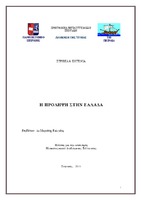Η πρόληψη στην Ελλάδα. - Prevention in Greece.

Προβολή/
Θεματική επικεφαλίδα
Προληπτική ιατρική ; Πολιτική υγείας ; Αγωγή υγείαςΠερίληψη
Η σημασία της πρόληψης είναι αδιαμφισβήτητη. Βασικός στόχος της πρόληψης είναι η αναίρεση ή διακοπή του παθογενετικού μηχανισμού, όπου αυτό είναι δυνατό στη διαδικασία που οδηγεί από την έκθεση του οργανισμού σε κάποιο παράγοντα κινδύνου ως και την εκδήλωση των συμπτωμάτων της νόσου. Η πρόληψη διακρίνεται σε πρωτογενή, δευτερογενή και τριτογενή. Η πρωτογενής πρόληψη περιλαμβάνει τα προληπτικά μέτρα που σκοπό έχουν την αποφυγή έναρξης παθογενετικών διαδικασιών που μπορούν να οδηγήσουν τελικά στην κλινική έκδηλη νόσηση και στο θάνατο του ατόμου. Περιλαμβάνει μέτρα με τα οποία επιτυγχάνεται η εξουδετέρωση αιτιολογικών παραγόντων της νόσου η αποφυγή έκθεσης του ατόμου στους αιτιολογικούς νοσογόνους παράγοντες και η ισχυροποίηση των ευαίσθητων ατόμων έναντι των αιτιολογικών νοσογόνων παραγόντων. Η Δευτερογενής πρόληψη αναφέρεται στα προληπτικά μέτρα τα οποία εφαρμόζονται όταν έχουν ήδη αρχίσει οι νοσογόνες παθογενετικές διαδικασίες και αποσκοπούν στην προσυμπτωματική διάγνωση των νοσημάτων σε πρώιμο στάδιο με σκοπό την καλύτερη πρόγνωση. Η τριτογενής πρόληψη, αφορά στα μέτρα που εφαρμόζονται προκειμένου να διασφαλιστεί η πρόληψη ανικανότητας, η αποκατάσταση βλαβών ή και η αποφυγή υποτροπών μιας ήδη εγκατεστημένης νόσου. Σκοπός της παρούσας εργασίας είναι ήταν να ανιχνεύσουμε κατά πόσο είναι ή θεωρεί ότι είναι ενημερωμένος ο πολίτης για την πρόληψη, για τους παράγοντες κινδύνου, για τον προληπτικό έλεγχο, τη σωστή διατροφή, το κάπνισμα, τα ναρκωτικά, το αλκοόλ, και από ποιές πηγές ενημερώνεται, προκειμένου να διαπιστώσουμε που υπάρχουν κενά και να διατυπώσουμε προτάσεις για το ποια μέσα είναι τα πιο κατάλληλα για τη σωστή ενημέρωση και πρόληψη. Για το σκοπό αυτό η μεθοδολογία που χρησιμοποιήθηκε ήταν ένα ειδικό ερωτηματολόγιο με 22 ερωτήσεις που αφορούσαν στην ενημέρωση των πολιτών για τους παράγοντες κινδύνου και τον προληπτικό έλεγχο, το οποίο μοιράστηκε σε δείγμα 80 ατόμων. Τα κυριότερα αποτελέσματα της έρευνας ήταν πως η ενημέρωση των πολιτών για την πρόληψη δεν θεωρείται επαρκής, ότι κύρια πηγή ενημέρωσης για την πρόληψη είναι η τηλεόραση και πως υπάρχει αναγκαιότητα για το σωστό σχεδιασμό και εφαρμογή προγραμμάτων αγωγής στα σχολεία για την πρόληψη. Τα συμπεράσματα της παρούσης εργασίας συγκεντρώνονται ως εξής : οι ερωτηθέντες γνωρίζουν ότι τα καρδιαγγειακά νοσήματα και ο καρκίνος είναι οι κυριότερες αιτίες θανάτου στην Ελλάδα. Σαν παράγοντες κινδύνου για τα παραπάνω νοσήματα ανέφεραν τη διατροφή , το κάπνισμα, την κληρονομικότητα, τη χρήση αλκοόλ και τη χρήση ναρκωτικών ουσιών. Ως κύρια πηγή ενημέρωσης θεωρείται η τηλεόραση-ραδιόφωνο. Το 77,50% των ερωτηθέντων δεν θεωρούν ότι υπάρχει επαρκής ενημέρωση για τους παράγοντες κινδύνου Παρόλα αυτά το 77,5% των ερωτηθέντων πιστεύει πως δεν υπάρχει επαρκής ενημέρωση για τη σωστή διατροφή και την κατανάλωση αλκοόλ και το 68,8% αντίστοιχα για τη χρήση ναρκωτικών. Αντίθετα για το κάπνισμα το 100% πιστεύει πως υπάρχει επαρκής ενημέρωση για τους κινδύνους του καπνίσματος. Το 100% πιστεύει ότι υπάρχει αναγκαιότητα να εφαρμοσθούν προγράμματα αγωγής υγείας στα σχολεία για την διατροφή, το κάπνισμα, το αλκοόλ και τη χρήση ναρκωτικών ουσιών και για τον προληπτικό έλεγχο. Η ενημέρωση για τους παράγοντες κινδύνου και για τον προληπτικό έλεγχο θεωρείται πάρα πολύ σημαντική σε ποσοστό 81,25 % και πολύ σημαντική σε ποσοστό 18,75 %. Τα ίδια ποσοστά ισχύουν και για τη σημασία εφαρμογής για τα προγράμματα αγωγής υγείας στα σχολεία. Παρά τις θετικές διαπιστώσεις από το διεθνή χώρο, στην Ελλάδα δεν έχει ακόμη διαμορφωθεί ενιαία εθνική πολιτική όσον αφορά την εφαρμογή προγραμμάτων πρόληψης. Για να αντιμετωπιστεί αποτελεσματικά η ενημέρωση των πολιτών σχετικά με την πρόληψη και τους παράγοντες κινδύνου πρέπει να υιοθετηθούν προσεγγίσεις δημόσιας πολιτικής υγείας οι οποίες θα βασίζονται στη διατομεακή συνεργασία όλων των αρμόδιων-σχετικών με την υγεία τομέων και στη χρήση επιτυχημένων εργαλείων και μεθόδων αγωγής υγείας (τηλεοπτικά προγράμματα, ειδικά εκπαιδευτικά προγράμματα, κ.λ.π.).


